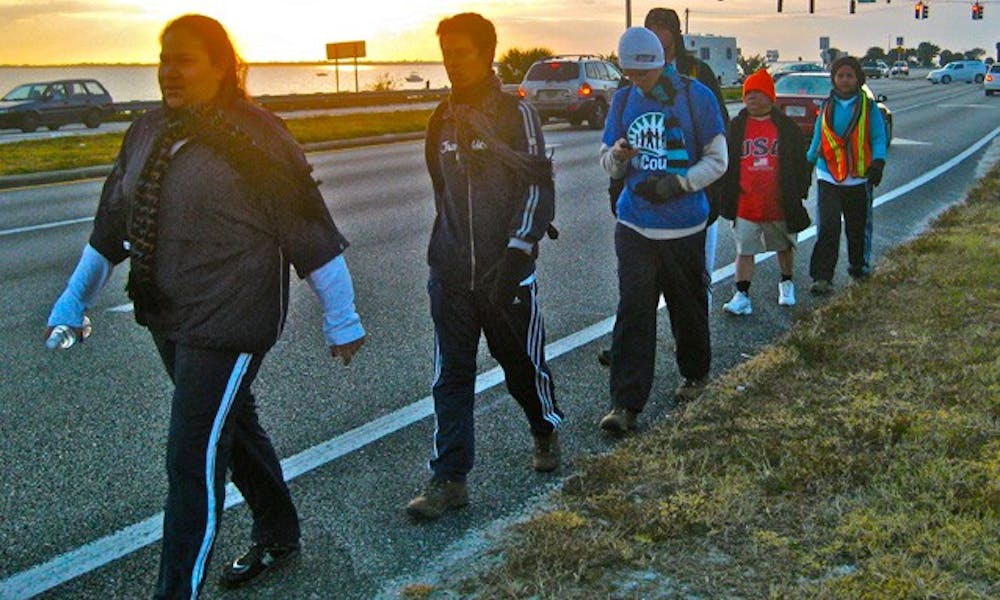When Felipe Matos applied to Duke, he was a top-ranked student in Florida’s community school system.
He was admitted to the University and a number of other top schools, but as an undocumented student without access to government-based financial aid he was unable to attend. Instead, he attends St. Thomas University in Florida, which he is able to afford with the help of two private merit scholarships.
Since January, Matos has been active in Trail of Dreams, an organization that raises awareness for equal opportunities for the undocumented. Earlier this year, he and other members marched from Miami, Fla. to Washington, D.C. to show support for undocumented students who cannot attend college.
“At this point, we don’t really have a choice but to get together and find ways to demonstrate what’s happening,” Matos said. “Fear can be something that paralyzes you or something that actually motivates you to really get together, organize and fight back.”
At Duke, the policies for admitting undocumented students are simple, Dean of Undergraduate Admissions Christoph Guttentag wrote in an e-mail. The University does not prevent undocumented students from applying, nor is it prevented from admitting those students. But for undocumented students, like other international students, Duke is “need aware” but not “need blind.” The admissions rate for applicants that are neither U.S. citizens nor legal permanent residents of the country is just 3.5 percent, Guttentag said.
“In other words, whether they apply for financial aid, and how much aid they would be eligible for, is taken into account when making the admissions decision,” Guttentag said. “This is because these students are not eligible for government-based financial aid, and so all financial aid for these students comes only from Duke funds.”
In North Carolina, the rights of undocumented students is an especially pertinent debate considering the growing Hispanic population. North Carolina is the home to a Hispanic population of about 678,000—the 11th largest in the country—according to the Pew Hispanic Center.
The University of North Carolina allows undocumented students to attend if they pay out-of-state tuition, UNC system spokeswoman Joni Worthington wrote in an e-mail Thursday.
Fewer than 30 undocumented students attended the state’s public colleges last year, however, The Daily Tar Heel reported last week.
Nationwide admissions
In many public universities, admissions policies for undocumented students frequently change as legislators pass and subsequently overturn laws that affect these students.
Earlier this month in Georgia the Board of Regents voted to bar undocumented immigrants from attending the state’s five most selective four-year public colleges. The ban, which will take effect next Fall, is the subject of fierce debate. Its supporters note that it is a response to concerns that undocumented students were taking away seats from qualified legal residents, and some state legislators hope to introduce a bill that would ban undocumented students from all public institutions.
“Personally, I am appalled by this ban,” said senior Christine Contreras, a member of Duke Students for Humane Borders. “It’s just kind of disheartening to know that Georgia as a state is taking a measure to... make it impossible for undocumented students to further their education whether they have the money for it or not.”
Contreras called the ban inconsistent, as undocumented children are educated in public elementary and high schools.
“The government is already investing in these students’ education... not allowing [them] to go on to college [is] just a complete waste of government funding,” she said.
Georgia’s former policy allowed undocumented students to pay out-of-state tuition in order to attend public universities. The legislation makes Georgia the second state in addition to South Carolina to require colleges with competitive admissions processes to check whether students are documented.
Some Duke students have actively supported legislation to grant illegal immigrants admission to the country’s universities. Catherine, a Duke student whose name has been changed to protect her family’s privacy, is an active supporter of the Development, Relief and Education for Alien Minors Act, which would help undocumented students eventually become eligible for financial aid after becoming citizens.
She said she realizes it is impossible to ask Duke to cover all of these students’ tuition. Instead, Catherine—whose mother is undocumented—has focused on political action to break down legislative barriers for equal opportunity.
The results of tomorrow’s midterm elections will likely affect the future of the DREAM Act, and Matos said he is optimistic that the nation’s policy will someday change.
Get The Chronicle straight to your inbox
Sign up for our weekly newsletter. Cancel at any time.
“What happened in Georgia was despicable because it feels like going back on time, in a time in the South when people were not allowed to go to certain colleges and to certain universities,” he said. “We believe that history will not fail us. We have seen time after time... groups that were discriminated against, but because of the work of... dedicated people those conditions were able to change.”

